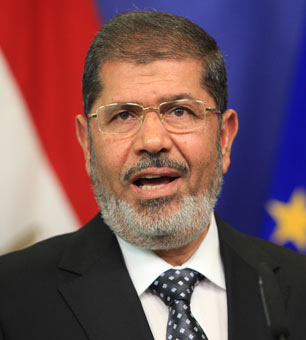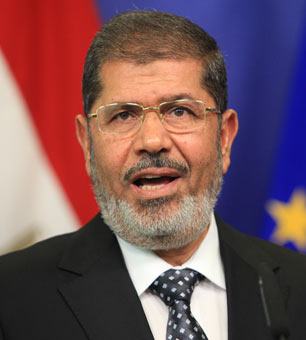Truthout is an indispensable resource for activists, movement leaders and workers everywhere. Please make this work possible with a quick donation.
 (Photo: European Union / Flickr)Egyptians are waking up with a mix of anticipation and worry as planned June 30 protests draw closer. The date marks what both the opposition and the ruling Muslim Brotherhood backers call an “historic day in Egypt’s history” — and as anti-government activists have defined it, the beginning of the end of the Islamic group that came to power with Mohamed Morsi exactly one year ago.
(Photo: European Union / Flickr)Egyptians are waking up with a mix of anticipation and worry as planned June 30 protests draw closer. The date marks what both the opposition and the ruling Muslim Brotherhood backers call an “historic day in Egypt’s history” — and as anti-government activists have defined it, the beginning of the end of the Islamic group that came to power with Mohamed Morsi exactly one year ago.
The anticipated June 30 protests were spurred by the group Tamarod, or “Rebel,” which called on Egyptians to sign a petition to remove President Morsi from power and hold early elections. Last week, the group announced it had collected 15 million signatures — and as of Saturday, it told Occupy.com that the numbers were at 18 million and counting.
The final signature tally will be announced on June 30.
Tamarod, an independent grassroots group founded in late April, is behind the movement that is now sweeping the political scene in Egypt, galvanizing both street action and media debate ahead of the June 30 action. Mass protests and millions of people are expected to take to the streets across the country on Sunday in a revival of the 2011 revolutionary spirit that toppled former President Hosni Mubarak.
“None of the revolution’s goals were achieved and we felt we must inspire people and galvanize them to join us and sign the petition demanding early elections,” Ahmed Abdo, member of the Central Committee of Tamarod, told Occupy.com via telephone from Cairo.
“[At] our first meeting, we had about 25 members who were very excited about the idea, while later other opposition groups joined us due to the massive success we were achieving. Now we are exceeding 18 million signatures.”
“We reached out to people in the street to join us and the results have been amazing,” he added.
Last Friday, in a preemptive counter-demonstration in support of Morsi, thousands of Brotherhood supporters gathered around Raba’a al Adawiya mosque in the Cairo neighborhood of Nasr City, calling for the president to finish his term and rejecting the June 30 protests. They chanted “Islamiya Islamiya,” or “Islamic Islamic,” and vowed to back the president to remain in power for three more years.
But President Morsi’s recent decision to appoint new governors across the country, including seven men affiliated with the Muslim Brotherhood, sparked violent clashes. Locals from the governates reject what they have called “the Muslim Brotherhood hegemony” over the country.
In some cities, protesters closed the gates of government office buildings to prevent the governors from commencing at their new posts. Clashes left over 100 injured across the seven governates in what many believe could be a precursor to possible widespread violence on June 30.
The opposition accused the president of using the new appointments as a way of solidifying the party’s dominance across Egypt — including in cities where the Muslim Brotherhood’s base is not strong.
In one case, the appointment in Luxor of Adel Khayat, from the terrorist-aligned Gama’a Islamiya, saw massive demonstrations by local residents. Khayat was a top official in the group responsible for the 1997 terrorist attack in the popular tourist destination that killed 62 people.
Following days of tension, Khayat stepped down last Sunday after mounting public anger and reports about tourists canceling their visits to the city.
The Islamic group lashed out in defense, issuing an official statement that “Khayat was not officially accused or convicted or detained for anything during the Mubarak era.”
At the same time, the United States seems to agree that President Morsi should remain put. In a recent talk at the Ibn Khaldun Center for Development Studies, American Ambassador to Egypt Anne Patterson addressed a crowd of human rights experts and advised them to give Morsi a chance.
“Morsi is not Mubarak,” said Patterson. “Some say that street action will produce better results than elections. To be honest, my government and I are deeply skeptical.”
“Egypt needs stability to get its economic house in order, and more violence on the streets will do little more than add new names to the lists of martyrs,” she said.
But the remarks backfired, with politicians and Egyptians alike criticizing the speech and its tone — and asking her via social media to “shut up” and not interfere in public life and Egyptians’ decisions.
On the other hand, the Muslim Brotherhood rejoiced in the official American support.
Anger and Frustration is Mounting
Tamarod was started two months ago by a group of six young activists who saw the Egyptian revolution’s ideals being shattered by the hardline Islamists led by Morsi. Frustration and anger in the streets was already visible when the group was forming. Abdo said they knew their message was going to be understood by those who suffer daily under the current conditions — but they never expected this scale of participation.
Social justice, freedom and dignity were the slogans of the January 25, 2011 revolution that toppled President Mubarak, who ruled the country with an iron fist for 30 years. But more than two years on from the revolution, and after a year of Morsi’s rule, the situation for many remains bleak.
“The Egyptian street is taken by a wave of frustration and anger, they want to live but with no power, water, car fuel or affordable foods, how could they?” Abdo added.
Since Morsi seized power, Egyptians have been vocally debating the absence of social justice, the failure of economic policies and the ongoing violence under the ruling regime. In addition to some personal rights disappearing, the state of public infrastructure has only worsened: power cuts for hours became a daily norm, along with petrol and diesel shortages, a hike in food prices, deteriorating public safety, and reports of police brutality.
Morsi supporters have accused Tamarod of being “felool,” or loyalists to the old regime. Tamarod counters that claim, affirming that it is a people’s movement which represents the grievances of everyday Egyptians.
“You can ask the simple street vendors who signed [the Tamarod petition] if they can go on like this any longer,” Abdo said. “All of Morsi’s promises were broken. If you walk down the street or take public transportation, you will hear people praying for an end to his rule. They are asking, ‘What has he done for us the past year?’”
Respected mainstream voices in Egyptian society are saying much of the same. In a recent news show on ONTV, Judge Hisham Bastaweesy, deputy of the Court of Cassation and a former presidential nominee in 2012, told “Adkher Kalam” (“Last Words”) host Youssry Fouda that “the significance of poverty is expanding and the number of the poor is increasing.”
Bastaweesy, one of many leading public figures who have signed the Tamarod petition, called it a regime “with classist bias that is against the benefit of the majority of Egyptians.”
Tamarod, together with the opposition, affirms that the June 30 protest will be peaceful and that no one on their side will resort to violence. They plan to only carry the Egyptian flag and to unify their chants against President Morsi and his policies.
Islamic media outlets, which claimed that the president’s supporters will also avoid violence, at the same time threatened the opposition protesters with death if they attempt to harm the president. A pro-Morsi Islamic cleric called the opposition “infidels” for wanting to rebel against a Muslim president, adding that the opposition should be “killed if they attempt to practice violence against the president’s supporters.”
According to Tamarod, the ruling party’s supporters continuously send them threats.
“We receive death threats over the phone and in texts,” said Abdo, and also “letters of intimidation. In the past three weeks, they have attempted to attack several of our petition headquarters, and attempted to steal petitions.”
Those attempts included a failed effort to burn down Tamarod’s main office in downtown Cairo, prompting the group to change its location.
While the Egyptian government has downplayed this Sunday’s action, observers say it could be a landmark moment in the political and social trajectory of the country. Prime Minister Hisham Qandeel told state press last week that the government has dealt with mass protests since it took power one year ago, implying that they expected nothing new.
But as Egyptians closely monitor the news in anticipation of June 30, the question many are asking is what will happen the day after.
“We are meeting with other opposition groups to discuss a clear plan for after June 30,” Abdo said. “The numbers are going to overwhelm the regime and we will stay until he leaves.”
A terrifying moment. We appeal for your support.
In the last weeks, we have witnessed an authoritarian assault on communities in Minnesota and across the nation.
The need for truthful, grassroots reporting is urgent at this cataclysmic historical moment. Yet, Trump-aligned billionaires and other allies have taken over many legacy media outlets — the culmination of a decades-long campaign to place control of the narrative into the hands of the political right.
We refuse to let Trump’s blatant propaganda machine go unchecked. Untethered to corporate ownership or advertisers, Truthout remains fearless in our reporting and our determination to use journalism as a tool for justice.
But we need your help just to fund our basic expenses. Over 80 percent of Truthout’s funding comes from small individual donations from our community of readers, and over a third of our total budget is supported by recurring monthly donors.
Truthout has launched a fundraiser to add 500 new monthly donors in the next 9 days. Whether you can make a small monthly donation or a larger one-time gift, Truthout only works with your support.
